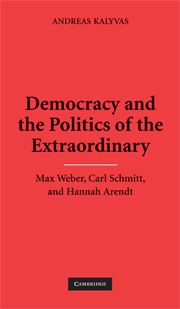Book contents
- Frontmatter
- Contents
- Acknowledgments
- List of Abbreviations
- Introduction: The Extraordinary and Political Theory
- I CHARISMATIC POLITICS AND THE SYMBOLIC FOUNDATIONS OF POWER
- II THE EXCEPTION AND CONSTITUTIONAL POLITICS
- 4 The Popular Constituent Sovereign and the Pure Theory of Democratic Legitimacy
- 5 Toward a Theory of Democratic Constitutionalism
- 6 The Extra-Institutional Sovereign
- III TAMING THE EXTRAORDINARY
- Conclusion: A Democratic Theory of the Extraordinary
- Bibliography
- Index
- References
6 - The Extra-Institutional Sovereign
Published online by Cambridge University Press: 04 August 2010
- Frontmatter
- Contents
- Acknowledgments
- List of Abbreviations
- Introduction: The Extraordinary and Political Theory
- I CHARISMATIC POLITICS AND THE SYMBOLIC FOUNDATIONS OF POWER
- II THE EXCEPTION AND CONSTITUTIONAL POLITICS
- 4 The Popular Constituent Sovereign and the Pure Theory of Democratic Legitimacy
- 5 Toward a Theory of Democratic Constitutionalism
- 6 The Extra-Institutional Sovereign
- III TAMING THE EXTRAORDINARY
- Conclusion: A Democratic Theory of the Extraordinary
- Bibliography
- Index
- References
Summary
Taken together, Schmitt's first and second moment of democratic politics share some remarkable similarities with Bruce Ackerman's theory of “dualist democracy.” Before turning to Schmitt's third moment of democracy, it is worth comparing the two constitutional thinkers. Despite the fact that the first was a conservative with authoritarian preferences and the second is a contemporary liberal constitutional scholar, there are many significant affinities that transcend rigid ideological oppositions and prevailing political dichotomies. Indeed, such a comparative exercise sheds more light on Schmitt's constitutional theory by inserting it into a wider historical context. More importantly, it clarifies the enduring relevance of his theory of the extraordinary as a critical lens for examining and evaluating one of the most ambitious contemporary efforts to articulate a democratic theory of constitutional politics. This comparative reading is also a suitable point of entry into Schmitt's theory of the third moment of democracy and the deeper theoretical and political reasons that propelled him to supersede dualist politics.
From Schmitt to Ackerman and Back to Schmitt
Much like Schmitt, Ackerman divides modern politics into two distinct periods: normal and higher lawmaking. The first refers to ordinary politics conducted by pressure groups, political elites, interest aggregation, party officials, and public bureaucrats according to the rules and procedures of an existing legality and with a minimum of democratic participation.
- Type
- Chapter
- Information
- Democracy and the Politics of the ExtraordinaryMax Weber, Carl Schmitt, and Hannah Arendt, pp. 163 - 186Publisher: Cambridge University PressPrint publication year: 2008



